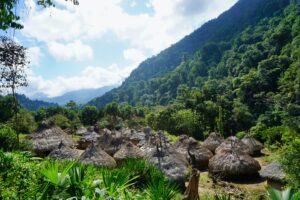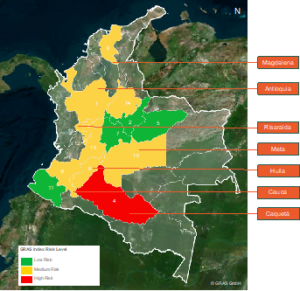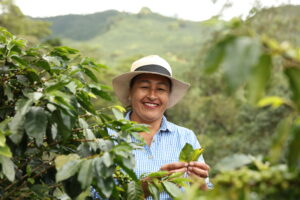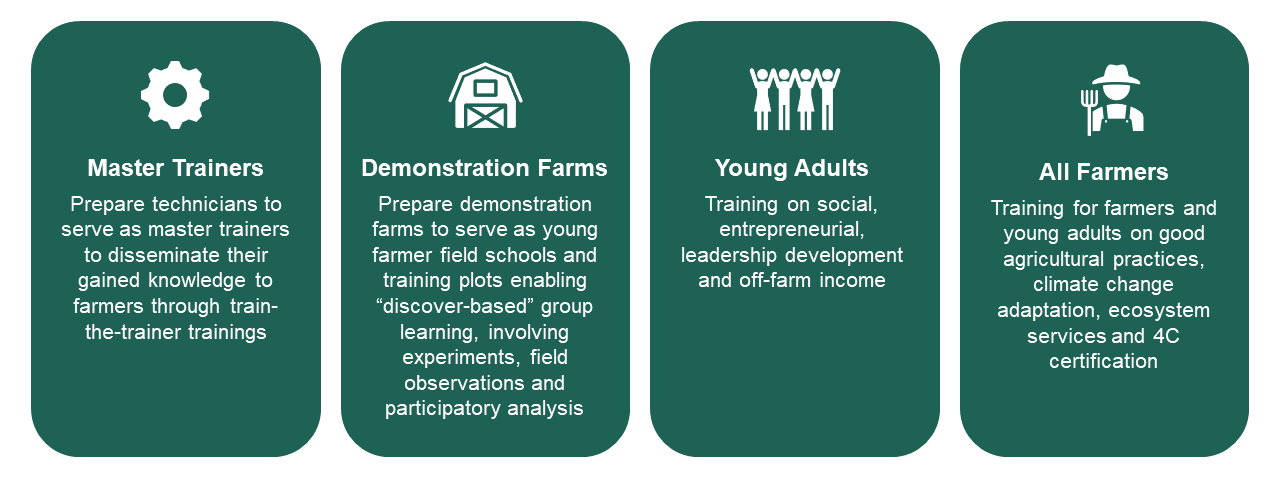4C partners with JDE Peet’s and DEG to reduce GHG emissions and strengthen climate resilience of smallholder producers

4C Services and JDE Peet’s are proud to announce the start of a joint project on “Reducing GHG emissions and increasing yields from Robusta coffee production by 7,000 smallholder farmers and processors in Tanzania”, co-financed by DEG – Deutsche Investitions- und Entwicklungsgesellschaft mbH – with funds of the develoPPP.de program of the German Federal Ministry for Economic Cooperation and Development (BMZ), together with funds of JDE Peet’s and 4C Services GmbH.
The project was successfully launched on 09 August 2021. Its main objective is to reduce GHG emissions from Robusta coffee production by smallholder farmers and processors in Tanzania within the JDE Peet’s supply chain by measuring and assessing the carbon footprint of coffee production, implementing mitigation strategies, supporting market uptake of climate friendly coffee and with this, creating positive socio-environmental benefits for the farmers and local communities of the coffee sector in Tanzania and beyond.
Environmental impact of coffee production in Tanzania and how it is addressed by the project

Coffee production has an impact on GHG emissions due to land use change/deforestation, non-regenerative soils which lack the potential to sequester carbon and poor agricultural and processing practices. Coffee cultivation accounts for approx. 90% of the product carbon footprint of roasted coffee. To successfully tackle these challenges, it is crucial to first get an in-depth insight of the drivers of GHG emissions in Robusta coffee production in the region, to then find adequate solutions for reducing these emissions on farm level and throughout the entire supply chain.
In cooperation with the implementing partners Touton S.A. and Karagwe District Cooperative Union (KDCU Ltd.) the project will quantify the carbon footprint of green coffee bean production in the Kagera region in Tanzania and identify potential reduction measures. Such measures will be implemented through the training of master trainers and the set-up of demonstration plots. The measures will be further integrated into the 4C Climate Friendly Coffee Add-on which will also be piloted with the farmers in the region. This will create market opportunities, support farmers in their efforts towards climate change mitigation and adaptation and at the same time facilitate coffee companies to work towards their climate neutrality goals.
“We are very happy to partner with 4C Services, DEG, Touton S.A and KDCU supporting over 7,000 smallholder farmers in Kagera, Tanzania to reduce GHG emissions through sustainable and climate friendly agricultural and processing practices. Tanzania is an important coffee origin that is critical towards safeguarding the rich diversity of coffee.” – Nadia Hoarau-Mwaura, Sustainability Director at JDE Peet’s
“We are very excited that together with our supply chain partners 4C will take action to measure GHG emissions in Robusta coffee production in Tanzania and support 7,000 farmers in the implementation of reduction measures.” – Dr. Norbert Schmitz, 4C Managing Director. “Through this common effort, we want to take the next step to assessing the carbon footprint and making climate friendly coffee supply chains a reality.”
About the develoPPP.de program
 develoPPP.de is a program launched by the German Federal Ministry for Economic Cooperation and Development (BMZ) in 1999 in order to foster the involvement of the private sector in areas where business opportunities and development policy initiatives overlap. DEG is one of the two official partners appointed by BMZ to implement the develoPPP.de program on its behalf.
develoPPP.de is a program launched by the German Federal Ministry for Economic Cooperation and Development (BMZ) in 1999 in order to foster the involvement of the private sector in areas where business opportunities and development policy initiatives overlap. DEG is one of the two official partners appointed by BMZ to implement the develoPPP.de program on its behalf.
For almost 60 years, DEG has been a reliable partner to private-sector enterprises operating in developing and emerging-market countries. Since the launch of the develoPPP.de program, DEG has implemented over 1,000 develoPPP.de projects worldwide.
4C partners with Melitta Europa and DEG to foster sustainability of the Colombian coffee production

 Magdalena is a Colombian department with a magnificent landscape that stretches from a wide plain in the southern area to the Caribbean Sea in the north. The region is known for the topical humid climate which allows productive activities like palm oil, banana and coffee. It also boasts a beautiful mountainous complex of the Sierra Nevada de Santa Marta which is the highest coastal mountain on Earth and one of the country´s most biodiverse regions. However, Magdalena is also one of the departments with the highest rates of rural poverty and youth unemployment in Colombia, as well as one affected greatest by the impact of climate change.
Magdalena is a Colombian department with a magnificent landscape that stretches from a wide plain in the southern area to the Caribbean Sea in the north. The region is known for the topical humid climate which allows productive activities like palm oil, banana and coffee. It also boasts a beautiful mountainous complex of the Sierra Nevada de Santa Marta which is the highest coastal mountain on Earth and one of the country´s most biodiverse regions. However, Magdalena is also one of the departments with the highest rates of rural poverty and youth unemployment in Colombia, as well as one affected greatest by the impact of climate change.
Magdalena is the region that was selected for the implementation of a three-year 4C sustainability project.
This project is conducted by 4C and its partners Melitta Europa GmbH & Co. KG and Deutsche Investitions- und Entwicklungsgesellschaft mbH (DEG) and aims to improve sustainable agricultural management of Colombian coffee growers and market uptake in Europe to contribute to the long-term economic and ecologic viability of smallholder farms, thus, increasing the attractiveness of the sector for young adults.
Decision making supported by remote sensing technology
 A balanced combination of remote sensing technologies, market links, local synergies and a baseline study were crucial for choosing the focus region of the project.
A balanced combination of remote sensing technologies, market links, local synergies and a baseline study were crucial for choosing the focus region of the project.
Global Risk Assessment Services (GRAS) conducted a “bird´s eye view” analysis and used data on protected areas, high carbon stock areas, potential deforestation, converted grassland and national social indices to define a risk index for each department. For an initial preselection of departments, these results were analysed with Melitta and compared with possible synergies with other similar projects.
Then 4C´s local partners Alliance for Bioversity International (ABC) and the International Center for Tropical Agriculture (CIA) compiled key information on the main social, environmental and economic challenges that make coffee production risky and volatile as well as unappealing for young adults. Major challenges for coffee farmers, found by the study, include high costs of coffee production, low productivity, lack of farm and income diversification, risk of deforestation and negative impact of climate change. The identified drivers for young adults to migrate to the cities and leave coffee production were the unattractiveness of the coffee sector due to heavy work, low income and absence of social recognition as well as the lack of access to capital and land.
Bringing together local and international partners
 In November 2020, 4C brought together 38 participants from NGOs, companies and local coffee cooperatives at an online multistakeholder workshop to present these findings. The workshop was an opportunity for stakeholders to discuss the main challenges and possible solutions. Furthermore, stakeholders exchanged ideas on how to better integrate youth in the Colombian coffee sector. Following the initial assessments and the workshop, 4C and its partners identified the department of Magdalena as the one with the greatest need for project intervention and defined the most relevant training topics.
In November 2020, 4C brought together 38 participants from NGOs, companies and local coffee cooperatives at an online multistakeholder workshop to present these findings. The workshop was an opportunity for stakeholders to discuss the main challenges and possible solutions. Furthermore, stakeholders exchanged ideas on how to better integrate youth in the Colombian coffee sector. Following the initial assessments and the workshop, 4C and its partners identified the department of Magdalena as the one with the greatest need for project intervention and defined the most relevant training topics.
“Through the active participation of various actors from the coffee industry, including coffee producers, traders, roasters, NGOs and research institutions, we are glad to have received a broad input on the main challenges to be addressed within the training program that we are in the process to develop together with FNC, ABC and NES Naturaleza, as well as input on training methodologies to be applied”, highlights Myriel Camp, Program Manager at 4C Services.
In comparison to the other six departments assessed, Magdalena showed low productivity, the highest rates of rural poverty, youth unemployment and lack of rural education. It was also one of the departments affected greatest by the impact of climate change, a risks losing the remaining forest due to deforestation. A decrease of almost 50% in a suitable area for coffee production is predicted. In addition, coffee productivity in Magdalena amounts to 0.71 tons/hectare, which is only half of that of departments such as Antioquia, Huila and Risaralda. Access to international markets for coffee represents only 2% of the total coffee exports from Colombia, in comparison to 10%-18% in the best performing departments.
When it comes to improved attractiveness of the sector for young adults, the baseline study revealed the demand for greater opportunities in terms of employability and strengthening youth initiatives and access to capital for implementing business ideas in the coffee industry.
“Having identified Magdalena as the project implementation region to best achieve impact on the ground and where the most need for intervention exists, fits into our vision, among other things, to support the market access of the farmers of the project. Magdalena is a region from which we source green coffees. Supporting here with our project to improve the livelihoods of coffee farmers and young adults makes us very happy”, says Jan Rischkopf, Sustainability Manager at Melitta Europa GmbH & Co. KG.
Engaging beneficiaries and local actors
In early 2021, the work in Magdalena began. The project was socialized with the coffee growers committee of Magdalena and with their support the target beneficiaries have been identified. Via radio program, SMS, posters and field visits, farmers and young adults are going to be informed about the project objectives and motivated to participate. Field visits to potential project beneficiaries, planned to start mid-March, will be led by experienced agronomists from the region. Measuring the impact is an important component of the project, the field officers will use a phone application developed by GRAS to collect the baseline data of the selected beneficiaries and in this way measure change over the timeframe of the project.
In addition, the project’s training program is currently under development in cooperation with the Federación Nacional de Cafeteros de Colombia (FNC), one of the main implementing partners of the project. “For the FNC it is a commitment to work for the well-being of Colombian coffee growing families and the development of the country, and therefore we are proud to work with allies such as 4C to generate value through the development of projects that increase the opportunities and profitability of coffee growers,” says Diego Robles Marcucci, Sustainable Trade Specialist at FNC. He added: “Through the Comité de Cafeteros del Magdalena, we work in this coffee-growing department, which includes around 5,000 producers to whom we provide services such as technical assistance in cultivation through the Facilitated Extension Service, purchase guarantees, scientific research and the promotion of Colombian coffee.”
Trainings’ topics, identified during the multistakeholder workshop, include, among others, the adoption of climate-smart agricultural practices and improving marketing and business skills for emerging businesses. The training program is the key component to bring changes in the sector. Different training approaches and methodologies will be applied, ranging from train-the-trainer trainings to demonstration farms serving as training ground and field schools for farmers and young adults. To enable the implementation of the learnings from the training, the project will support these activities with financial contributions for required investments.

“Within the framework of the DeveloPPP project, we will be able to generate important synergies with relevant actors in the supply chain to contribute to the profitability of coffee growing and the well-being of coffee growers”, concluded Diego Robles Marcucci from FNC.
Further information on the project and the results of the baseline study can be found here.
About the develoPPP program
develoPPP is a program launched by the German Federal Ministry for Economic Cooperation and Development (BMZ) in 1999 in order to foster the involvement of the private sector in areas where business opportunities and development policy initiatives overlap. DEG is one of the two official partners appointed by BMZ to implement the develoPPP program on its behalf.